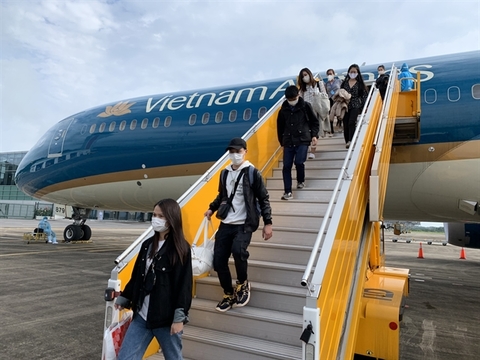 |
|
Passengers disembark from a Vietnam Airlines jet. The airline has recently lodged an appeal, calling for favourable policies amid higher fuel costs.
|
Vietnam Airlines revealed that Jet-A1 fuels hitting over US$130 per barrel in early March were pushing up fuel costs.
Its costs will increase by around VND5.7 trillion ($249 million) in 2022 if jet fuels stay at the same level.
Alternatively, the airline would have to pay VND9.1 trillion more for fuel if prices go up to $160 per barrel. In the worst scenario, the prices may hit over $200 per barrel.
Accordingly, Vietnam Airlines has requested the MoT to raise airfare ceilings and allow fuel surcharges on domestic flights to cover its higher costs.
The flag carrier has also asked the MoF to exempt environment tax on jet fuels in 2022 to ease its tax burden. If the tax break is approved, it will save the airline around VND600 billion.
Meanwhile, Vietravel Airlines has called for the removal of tariffs on imported jet fuel and lower environment tax until year-end, to VND1,000 ($0.044) per litre.
Vietravel Airlines has also asked for the credit package for aviation enterprises being disbursed at a faster pace.
The air carrier wants the Government to grant it credit support in loans with preferential interest rates for 3-5 years.
It also suggested an exemption of corporate income tax for 2021 and a reduction of value-added tax (VAT) to 5 per cent to stimulate demand.
Finally, it wants to collect fuel surcharges on domestic air routes because Jet-A1 prices have surpassed $100 per barrel.
Bui Doan Ne, deputy chairman and general secretary of the Vietnam Aviation Business Association, revealed that other regional countries have allowed their airlines to collect fuel surcharges.
Notably, air carriers in Malaysia, Thailand, South Korea and Japan have begun to charge each passenger $5-10 more for fuel.
Meanwhile, in Viet Nam, air carriers have to bear three types of fuel tax, including import tariff, environment tax and VAT.
Vietnamese airlines would have more elbow room for fare setting to cover higher costs and maintain competitive advantages with the surcharge policy.
“No one wants to raise airfares. But if fuel prices continue to increase steadily and reach an intolerable level, airlines will have no choice but to do so,” Ne said.
He also urged commercial banks to support air firms amid mounting costs by offering loans at low-interest rates and allowing deferred payments.
Ngo Tri Long, former director of Price Market Research Institute under MoF, believed that the authorities should cut environment tax to boost the recovery of domestic airlines.
Regarding the proposals to raise airfare ceilings and impose fuel surcharges, he said the authorities should approve one of the two, but not both.
Otherwise, the approval would fuel inflation and hurt air passengers, slowing down tourism recovery.
“The authorities should choose either higher airfare caps or the imposition of fuel surcharges, but not both. If they choose both, inflation will climb up, and air passengers will be badly affected”, explained the former director.
Dinh Viet Thang, director of Civil Aviation Authority of Vietnam (CAAV), shared this view. He said airfare caps should not be adjusted because the move would negatively impact inflation.
Instead, fuel surcharges were more suitable to help air firms reduce their financial woes.
“Imposition of fuel surcharges requires the green light from the MoF. The CAAV is considering the appeal,” he said.
Source: VNS